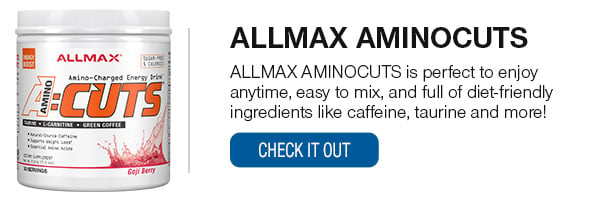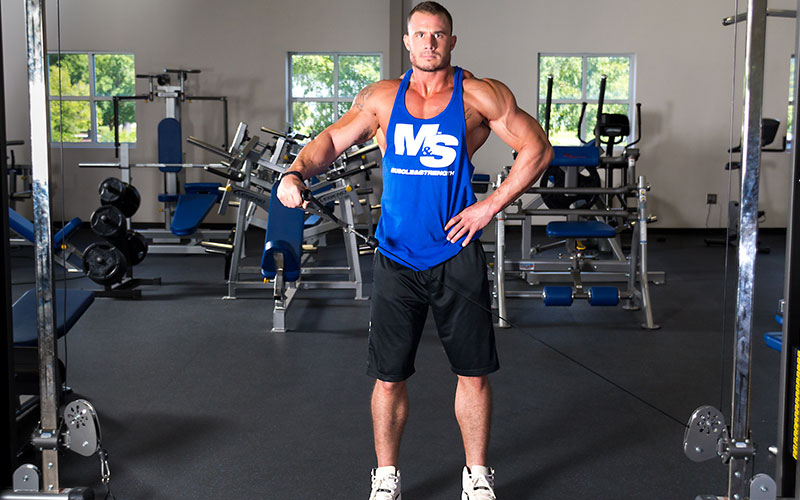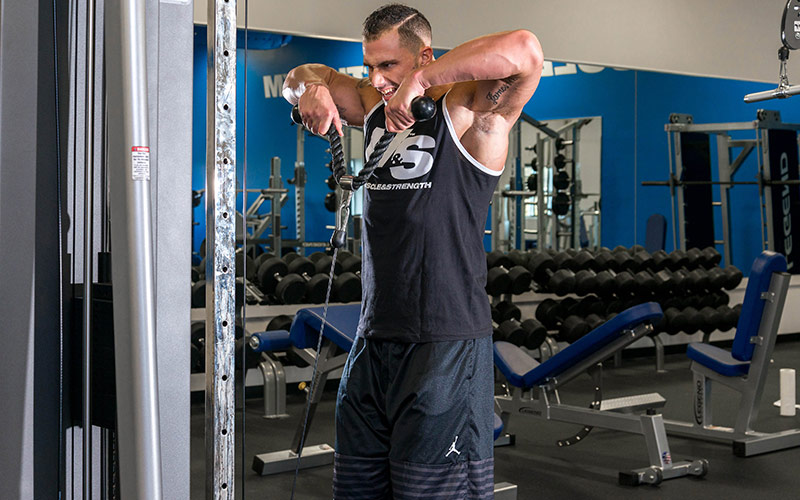01dragonslayer
Ripped
- Jacked Cash
- 537,260
Is the modern lifter really willing to do what it takes to build major muscle? Try training like an old-school legend for big results!
Today many aspiring muscle contenders overcomplicate what should be a relatively straightforward mission. With the advent of the internet and a subsequent plethora of conflicting advice and bro science masquerading as indisputable fact, much confusion reigns among today’s muscle hungry lifters.
Eager to pack on enough size to rival the Ronnie Colemans of the world, today’s bodybuilding beginner invariably seeks every anabolic advantage while trying all available size-building methods – many concurrently – in an attempt to find the “perfect solution” to their weight gain woes. Is such training and nutritional eclecticism smart?
Despite their undoubted enthusiasm and willingness to do ‘whatever it takes’, are modern era lifters fully tapping their genetic potential, or unwittingly stifling potential progress?
Do a greater variety of training tactics, equipment, and fitness "experts" hold promise for devoted iron trainees? Or might a return to the bodybuilding ways of old, where simplicity ruled and gains reigned, be the best approach of all? Let’s take a closer look at how old school mass building may in fact be the solution to substantial size gains, regardless of your training stage.
Related: Arnold's Volume Training Routines
Rather, these pioneers expanded the muscle building parameters of what many gym outsiders felt achievable. They picked an approach best suited to their individual body type, adhering to basic heavy exercises and applying the single most important bodybuilding variable of all: a willingness to work hard supported by a tunnel-vision approach to training that rendered all outside distractions irrelevant and meaningless.
No selfies, no idle chit chat, no reducing intensity due to muscle fatigue, and no half-assing it in the name of maximizing recovery. This was back when training to failure really meant training to failure. Where a set to completion demanded that not a further single rep would be achieved without assistance. Perhaps the lifters of old trained for different reasons than lifters of today.
A true love for the training process, a genuine desire to test their physical development, and the excitement associated with exploring uncharted territory undoubtedly drove those bodybuilders to work hard.
Bodybuilders of old (50s through to the 80s) were an exclusive club. Without the advantages of sophisticated pre-workout supplements, muscle-nourishing whey proteins, and other anabolic agents, lifters had to go to extreme lengths to provoke a muscle building response.
Vomit-inducing workouts were considered not only a badge of honor, but also crucial in stimulating maximum muscle microtrauma and subsequent size gains. To train hard meant leaving every ounce of effort in the gym along with puddles of sweat and layers of chalk dust.
To build mass like an iron game legend requires a similar degree of intensity and dedication. Sadly, many of today’s gyms discourage true hardcore training. Moving maximum iron to complete muscle failure is not achieved without a fair degree of physical expression and the occasional dropping of weights.
Fortunately there's salvation in hardcore gyms such as Metroflex and others like it. Serious bodybuilders are urged to frequent these kinds of gyms. Once you selct a free weight dominant gym, it's time to select a back-to-basics mass building approach designed to deplete and damage all targeted muscles.
Gyms that frown upon bodybuilding-style training are to be avoided like an overreliance of cables and machines when aiming to build pure mass.
Old school bodybuilders were not averse to upping the training volume. In fact, many of them believed that overtraining was a myth perpetuated by those who chose to under-eat and under-rest. Bottom line, you'll get more muscle growth if you:
Old school lifters knew this, and trained higher volume, training each muscle group up to three times a week with multiple sessions scheduled throughout the day. They also had solid nutrition with plenty of fresh whole foods and protein supplements.
Today’s bodybuilders frequently do more cardio than weights. Too much cardio, however, can deplete energy levels and negate weight training intensity. Excessive cardio can also directly deplete muscle protein stores thereby curtailing protein synthesis and, ultimately, muscle growth.
To reap cardio’s many benefits – improved blood, oxygen, and nutrient circulation, fat burning, and mental wellbeing to name but three – without interfering with muscle rebuilding, keep sessions short, intense and infrequent. Try 3-4 30-minute HIIT sessions per week – first thing in the morning on an empty stomach.
Related: What Kind of Cardio Is Best for Fat Loss? See What the Research Says
Assuming one’s diet is on point, weight training intensity is high, and resistance training is scheduled on a near-daily basis for one hour per session, then body fat is likely to be kept at bay and the subsequent muscle gains will ensure that one’s metabolic machinery continues to support the shredding process.
By keeping training and nutrition simple and focused, as outlined above, consistent muscle-building progress will surely follow. Rather than being discouraged that your new nano-micro-filtrated-anabolic-super-supplement is not working fast enough or that your six-minutes-to-shredded-abs program is not delivering, perhaps it is time to get under the squat rack and bang out an extra three reps per set.
Perhaps it's time to train to the point of exhaustion, to where the extreme muscle burn of a grueling set forces you to stop before irreparable damage is incurred. Perhaps it is time to adopt an old school bodybuilding mindset and do what the lifters of old did to build their massive physiques: Train big, eat big, rest big, and repeat.
WORKOUT SUMMARY
- Main Goal
Build Muscle - Workout Type
Split - Training Level
Intermediate - Program Duration12 weeks
- Days Per Week
6 - Time Per Workout45-60 minutes
- Equipment Required
Barbell, Cables, Dumbbells, Machines - Target GenderMale & Female
- Workout PDFDownload Workout
Workout Description
The muscle building equation was once a relatively simple one: train hard and often, eat big, and get enough rest and recovery to rebuild damaged muscle. Keeping the mass gaining process simple by completing each of these steps on a consistent basis guaranteed gargantuan gains and ongoing muscle growth.Today many aspiring muscle contenders overcomplicate what should be a relatively straightforward mission. With the advent of the internet and a subsequent plethora of conflicting advice and bro science masquerading as indisputable fact, much confusion reigns among today’s muscle hungry lifters.
Eager to pack on enough size to rival the Ronnie Colemans of the world, today’s bodybuilding beginner invariably seeks every anabolic advantage while trying all available size-building methods – many concurrently – in an attempt to find the “perfect solution” to their weight gain woes. Is such training and nutritional eclecticism smart?
Despite their undoubted enthusiasm and willingness to do ‘whatever it takes’, are modern era lifters fully tapping their genetic potential, or unwittingly stifling potential progress?
Do a greater variety of training tactics, equipment, and fitness "experts" hold promise for devoted iron trainees? Or might a return to the bodybuilding ways of old, where simplicity ruled and gains reigned, be the best approach of all? Let’s take a closer look at how old school mass building may in fact be the solution to substantial size gains, regardless of your training stage.
The Key Variable
With so many methods, many upcoming bodybuilders are going from one craze to the next, never applying maximum effort to one solid plan of attack. Iron legends of old were comparatively set in their ways. The Arnolds, Ferrignos, and Drapers of bodybuilding’s first Golden Era of the 60s and 70s were not exactly open to experimentation when it came to lifting mammoth weights.Related: Arnold's Volume Training Routines
Rather, these pioneers expanded the muscle building parameters of what many gym outsiders felt achievable. They picked an approach best suited to their individual body type, adhering to basic heavy exercises and applying the single most important bodybuilding variable of all: a willingness to work hard supported by a tunnel-vision approach to training that rendered all outside distractions irrelevant and meaningless.
No selfies, no idle chit chat, no reducing intensity due to muscle fatigue, and no half-assing it in the name of maximizing recovery. This was back when training to failure really meant training to failure. Where a set to completion demanded that not a further single rep would be achieved without assistance. Perhaps the lifters of old trained for different reasons than lifters of today.
A true love for the training process, a genuine desire to test their physical development, and the excitement associated with exploring uncharted territory undoubtedly drove those bodybuilders to work hard.
Bodybuilders of old (50s through to the 80s) were an exclusive club. Without the advantages of sophisticated pre-workout supplements, muscle-nourishing whey proteins, and other anabolic agents, lifters had to go to extreme lengths to provoke a muscle building response.
Vomit-inducing workouts were considered not only a badge of honor, but also crucial in stimulating maximum muscle microtrauma and subsequent size gains. To train hard meant leaving every ounce of effort in the gym along with puddles of sweat and layers of chalk dust.
To build mass like an iron game legend requires a similar degree of intensity and dedication. Sadly, many of today’s gyms discourage true hardcore training. Moving maximum iron to complete muscle failure is not achieved without a fair degree of physical expression and the occasional dropping of weights.
Fortunately there's salvation in hardcore gyms such as Metroflex and others like it. Serious bodybuilders are urged to frequent these kinds of gyms. Once you selct a free weight dominant gym, it's time to select a back-to-basics mass building approach designed to deplete and damage all targeted muscles.
Gyms that frown upon bodybuilding-style training are to be avoided like an overreliance of cables and machines when aiming to build pure mass.
Old school bodybuilders were not averse to upping the training volume. In fact, many of them believed that overtraining was a myth perpetuated by those who chose to under-eat and under-rest. Bottom line, you'll get more muscle growth if you:
- follow an old school nutrition plan heavy on quality nutrients (clean proteins, fats, and carbs). There's no need for extreme nutrient restricting diets
- live a stress-free lifestyle
- consistenly get sufficient rest and sleep.
Old school lifters knew this, and trained higher volume, training each muscle group up to three times a week with multiple sessions scheduled throughout the day. They also had solid nutrition with plenty of fresh whole foods and protein supplements.
Keeping it Simple and Muscle Focused
Golden era lifters did not cardio their muscles into increasing oblivion. Nor did these early iron legends periodize their training, thus encouraging the tapering off of intensity at various training stages. Workouts were weights-focused, cardio was minimal, – though cardio is most certainly encouraged today due to its health benefits – and intensity was consistently high.Today’s bodybuilders frequently do more cardio than weights. Too much cardio, however, can deplete energy levels and negate weight training intensity. Excessive cardio can also directly deplete muscle protein stores thereby curtailing protein synthesis and, ultimately, muscle growth.
To reap cardio’s many benefits – improved blood, oxygen, and nutrient circulation, fat burning, and mental wellbeing to name but three – without interfering with muscle rebuilding, keep sessions short, intense and infrequent. Try 3-4 30-minute HIIT sessions per week – first thing in the morning on an empty stomach.
Related: What Kind of Cardio Is Best for Fat Loss? See What the Research Says
Assuming one’s diet is on point, weight training intensity is high, and resistance training is scheduled on a near-daily basis for one hour per session, then body fat is likely to be kept at bay and the subsequent muscle gains will ensure that one’s metabolic machinery continues to support the shredding process.
By keeping training and nutrition simple and focused, as outlined above, consistent muscle-building progress will surely follow. Rather than being discouraged that your new nano-micro-filtrated-anabolic-super-supplement is not working fast enough or that your six-minutes-to-shredded-abs program is not delivering, perhaps it is time to get under the squat rack and bang out an extra three reps per set.
Perhaps it's time to train to the point of exhaustion, to where the extreme muscle burn of a grueling set forces you to stop before irreparable damage is incurred. Perhaps it is time to adopt an old school bodybuilding mindset and do what the lifters of old did to build their massive physiques: Train big, eat big, rest big, and repeat.
Old School Workout Plan for Maximum Size Gains
Complete this program for a full 15 weeks, increasing weight in line with increasing strength levels.Monday Morning: HIIT Cardio
| Exercise | Time |
|---|---|
| HIIT Cardio (exercise bike or treadmill) | 30 minutes: 40 sec high intensity followed by 1 min moderate intensity |
Monday Evening: Chest/Shoulders/Triceps
| Exercise | Sets | Reps |
|---|---|---|
| 1. Chest Dips | 4 | 8-12 (add weight if needed) |
| 2. Dumbbell Bench Press | 4 | 8-12 |
| 3. Incline Dumbbell Bench Press | 4 | 8-12 |
| 4a. Arnold DB Press | 4 | 8-12 |
| 4b. DB Lateral Raise | 4 | 8-12 |
| 5. Dumbbell Front Raise | 4 | 8-12 |
| 6a. Close Grip Bench Press | 4 | 8-12 |
| 6b. Rope Pressdowns | 4 | 8-12 |
| 7. Dumbbell Triceps Kickbacks | 4 | 8-12 |
Tuesday: Legs
| Exercise | Sets | Reps |
|---|---|---|
| 1a. Wide Stance Squats | 4 | 10-15 |
| 1b. Leg Extensions | 4 | 10-15 |
| 2. Front Squats with a Narrow Stance | 4 | 8-12 |
| 3. Walking Dumbbell Lunges | 4 | 15-20 (each side) |
| 4. Leg Press | 3 | 15-20 |
| 5a. Lying Leg Curls | 3 | 8-12 |
| 5b. Stiff-Legged Deadlift | 3 | 8-12 |
| 6. Standing Calf Raise | 4 | 15-20 |
Wednesday Morning: HIIT Cardio
| Exercise | Time |
|---|---|
| HIIT Cardio (exercise bike or treadmill) | 30 minutes: 40 sec high intensity followed by 1 min moderate intensity |
Wednesday Evening: Back/Biceps
| Exercise | Sets | Reps |
|---|---|---|
| 1. Chin Ups | 4 | 8-12 (add weight if needed) |
| 2. Reverse Grip Lat Pulldowns | 4 | 8-12 |
| 3a. One Arm DB Rows | 4 | 8-12 |
| 3b. Seated Cable Rows | 4 | 8-12 |
| 4a. DB Hammer Curls | 4 | 8-12 |
| 4b. Incline DB Curls | 4 | 8-12 |
| 5. Barbell Curls | 4 | 8-12 |
Thursday: Chest/Shoulders/Triceps
| Exercise | Sets | Reps |
|---|---|---|
| 1. Bench Press | 3 | 8-12 |
| 2. Incline Barbell Press | 3 | 8-12 |
| 3. Decline DB Press | 3 | 8-12 |
| 4. DB Press | 3 | 8-12 |
| 5. Bent-Over DB Lateral Raise | 3 | 8-12 |
| 6a. Triceps Dip | 3 | 8-12 |
| 6b. DB Kickbacks | 3 | 8-12 |
| 7. One Arm Overhead Triceps Extensions | 3 | 8-12 |
Friday Morning: HIIT Cardio
| Exercise | Time |
|---|---|
| HIIT Cardio (exercise bike or treadmill) | 30 minutes: 40 sec high intensity followed by 1 min moderate intensity |
Friday Evening: Legs
| Exercise | Sets | Reps |
|---|---|---|
| 1. Medium Width Squats | 4 | 10-15 |
| 2a. Leg Extensions | 3 | 8-12 |
| 2b. Hack Squats | 3 | 8-12 |
| 3. Standing One Legged Curls | 3 | 8-12 |
| 4a. Seated Calf Raise | 3 | 15-20 |
| 4b. Standing Calf Raise | 3 | 15-20 |
Saturday Morning: HIIT Cardio
| Exercise | Time |
|---|---|
| HIIT Cardio (exercise bike or treadmill) | 30 minutes: 40 sec high intensity followed by 1 min moderate intensity |
Saturday Evening: Back/Biceps
| Exercise | Sets | Reps |
|---|---|---|
| 1. Deadlifts | 4 | 8-12 |
| 2. Reverse Grip Bent Over Barbell Rows | 3 | 8-12 |
| 3. Chin Ups | 3 | 8-12 |
| 4. Alternate DB Curls | 3 | 8-12 |
| 5. Reverse Barbell Curls | 3 | 8-12 |







